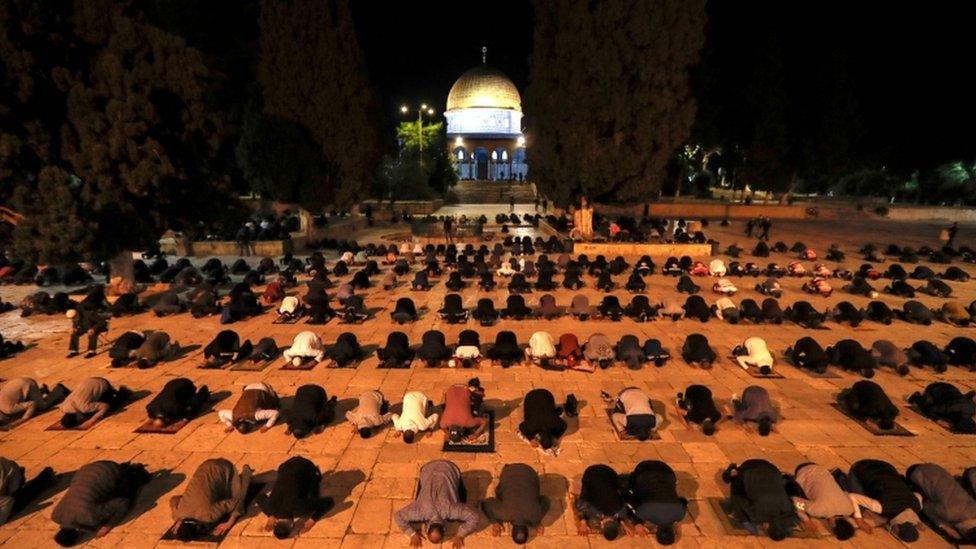Coronavirus: Famous mosques reopen in Saudi Arabia and Jerusalem
- Published

Lockdown measures have been eased at some of Islam's holiest sites
Some of the most important sites in Islam have reopened two months after the coronavirus pandemic forced them to shut, allowing worshippers to enter under strict guidelines.
Hundreds of Muslims filed into Jerusalem's Al-Aqsa Mosque, Islam's third holiest site, for morning prayers on Sunday.
Some chanted "God is great", while others kissed the ground as crowds entered.
Inside, precautions were taken to reduce the risk of the virus spreading.
Crowds of worshippers poured in through the gates of Jerusalem's Al-Aqsa Mosque
Worshippers had their temperatures checked, stood at a distance from each other, and were asked to wear masks and bring their own prayer mats.
"After they opened the mosque, I feel like I can breathe again. Thanks be to God," said Umm Hisham, from Jerusalem, appearing emotional as she walked into the mosque.
Some worshippers chanted "God is great" as they entered the mosque
The Al-Aqsa Mosque, and many other holy sites, have been off limits to Muslims since mid-March, meaning they were unable to host daily prayers during Ramadan.
Though the threat of the coronavirus still remains, many countries are easing restrictions in a gradual way after weeks of lockdown, opening up holy sites to limited numbers of worshippers and visitors.
Al-Aqsa is one of the most important sites in Islam
In Saudi Arabia on Sunday, there were similar scenes at the Prophet's Mosque in the city of Medina, where worshippers gathered for prayers.
The mosque was one of around 90,000 that were being prepared for reopening by Saudi authorities.
Ahead of the reopening, millions of believers were sent text messages in multiple languages to inform them about the new rules for public prayer.
Millions of Saudis were sent text messages urging them to observe social distancing when worshipping at mosques
The text messages, sent by the Ministry of Islamic Affairs, urged worshippers to pray two metres (6.5ft) apart, and to refrain from greeting each other with hugs or handshakes.
People were told to carry out their usual washing ritual at home, because washrooms at mosques will remain closed.
Saudi Arabia is in the process of easing its lockdown restrictions
Sermons and prayers are to last no more than fifteen minutes.
The Grand Mosque in Mecca will remain closed until further notice. Islam's holiest site, the mosque normally attracts millions of visitors every year, many of whom travel there for the Hajj pilgrimage.
All pictures copyright
- Published26 April 2020
- Published12 May 2020
- Published4 May 2020